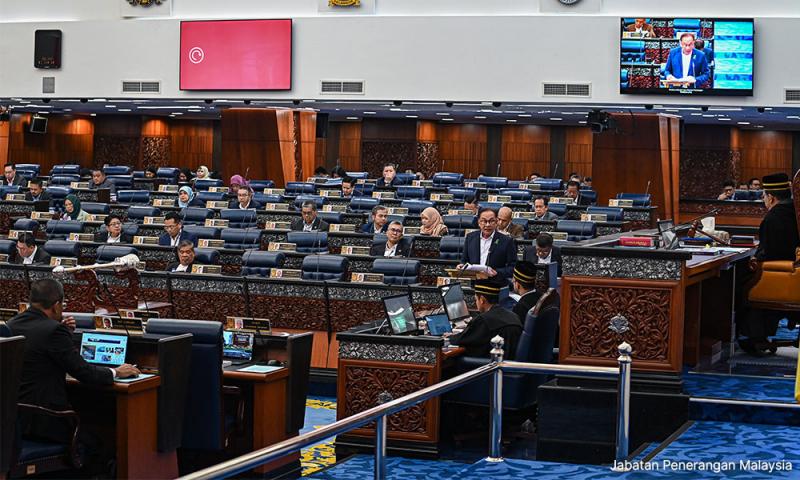LETTER | MPs should behave, do away with petty politicking in Parliament
LETTER | The Malaysian Parliament plays a pivotal role in the country’s democratic system. It is where elected representatives gather to debate, legislate, and hold the government accountable.
However, recent years have witnessed quite alarming trends in the August House, with glaring absenteeism of some MPs while some prefer to resort to engaging in frivolous disputes and the use of unparliamentary words that lead to shouting matches.
All these not only undermine the democratic process but also squander taxpayers’ hard-earned money.
Elected to represent the interests and concerns of their voters, it becomes the primary duty of MPs to be present during parliamentary sessions. However, a significant number of MPs have been consistently missing, raising questions about their commitment and responsibility to serving their constituents and the country’s democratic process.
Being absent simply means they are doing a disservice to taxpayers who fund their salaries, benefits, and the infrastructure required for the functioning of Parliament.
From official records, Perikatan Nasional MPs, however, have shown improved attendance in the first session of the Dewan Rakyat (the lower house of Parliament) this year.
Records showed PN MPs had an average attendance rate of 29 days out of 31 (93.5 percent), a significant increase from 72.3 percent.
In contrast, the Madani Government MPs only had an average attendance of 27.4 days (88.4 percent in attendance rate).
The attendance records, which were effectively implemented in July 2021, do not differentiate between MPs present for the entire day or just a few minutes. MPs check in on their computers upon arrival and parliamentary staff periodically record their attendance.
On Wednesday (Nov 1), the afternoon session of the Dewan Rakyat was briefly suspended for two minutes due to a lack of quorum, or the minimum 26 members required for a meeting to proceed.
The suspension occurred after PN’s Indera Mahkota MP Saifuddin Abdullah raised concerns about his fellow lawmakers’ poor turnout while the natural resources, environment and climate change minister was addressing the session.
It soon resumed after the bell was rung for two minutes and after it was determined that the number of MPs present was sufficient to continue the proceedings.
In another recent incident, both the foreign minister and deputy foreign minister were absent and a question posed to them had to be postponed.
MPs also tend to debate petty disputes and issues, often overshadowing substantial legislative matters.
Instead of focusing on critical national issues such as economic development, healthcare, education and environmental concerns, some MPs have been known to engage in trivial, sometimes embarrassing squabbles.
Such behaviours not only reflect poorly on the image of the Malaysian Parliament but also hamper the effectiveness of the legislative process.
The time and resources spent on unproductive debates and personal disputes could be better utilised in discussing and enacting laws that genuinely benefit the people.
When elected representatives fail to fulfil their duties, the very essence of democracy is undermined. Taxpayers have to bear the brunt of the financial burden as they fund MPs’ salaries, facilities and other associated expenses. Absenteeism and trivial debates are evidence of inefficient use of taxpayers’ money.
The people also suffer indirectly when important legislation is delayed or remains unresolved due to time wasted on inconsequential matters. Economic, social, and environmental concerns that demand urgent attention are put on the back burner, ultimately hindering the country’s progress.
It is high time that MPs shape up as Malaysian citizens are increasingly demanding accountability and transparency from their elected representatives in looking after their welfare.
Maybe some of these measures should be put in place to make them behave really like one.
Stricter attendance requirements should be introduced to help ensure that all MPs are present when Parliament is in session.
A Code of Conduct should be adopted so that they can set good, ethical standards and behaviours while debating on important national matters, live on television.
The electoral system also needs to undergo reforms to encourage better and more qualified candidates to enter politics and provide opportunities for fresh, dedicated voices of the people to be in the limelight of serving the people.
All elected representatives should be made to go for social, economic, and policy-making courses or training from time to time to help equip themselves with better oratorial and debating skills as well as knowledge.
The Malaysian Parliament plays a vital role in shaping the nation’s future and it is imperative that all its members take their responsibilities seriously. Wasting taxpayers’ money and time with absenteeism and petty disputes will weaken not only our democratic process but jeopardise the nation’s progress and erode public trust in their elected representatives.
Chaotic situations and continued shouting matches in Parliament only productive debates and legislative progress, rational discourse, and thoughtful discussion. Such behaviours detract from the purpose of a parliamentary session - to address critical issues, make informed decisions and represent the interests of the public at large.
For the younger generation, MPs serve as role models and symbols of democratic values.
When MPs exude diligence, integrity, and dedication in their parliamentary duties, they inspire confidence and professionalism but if they continue to display apathy, absenteeism, or engage in trivial debates, the young will only harbour negative or wrong impressions not only against them but also our democratic process.
As such, their conduct and behaviour must leave a profound impact on how our younger generation will perceive and engage with the democratic system in upholding the democratic ideals that Malaysia aspires to embody.
The views expressed here are those of the author/contributor and do not necessarily represent the views of Malaysiakini.
RM12.50 / month
- Unlimited access to award-winning journalism
- Comment and share your opinions on all our articles
- Gift interesting stories to your friends
- Tax deductable
